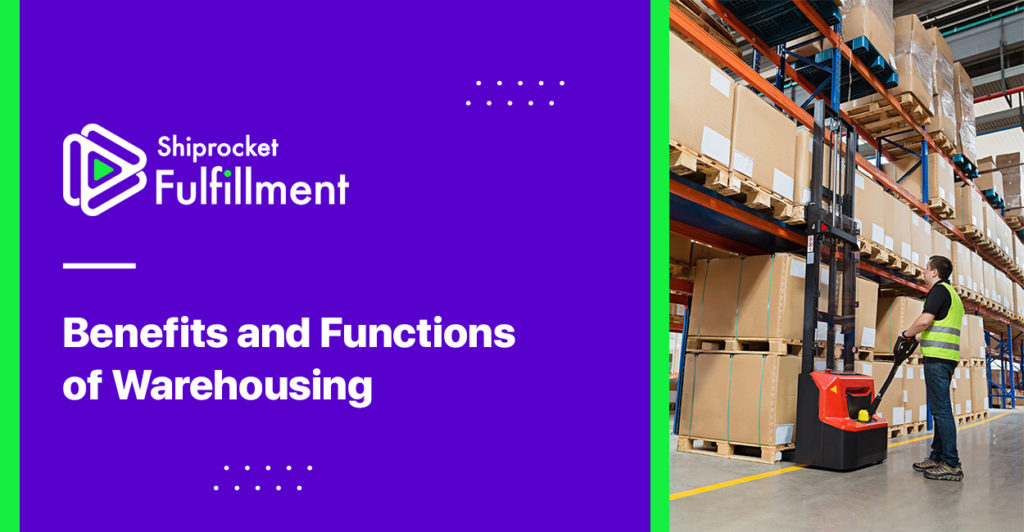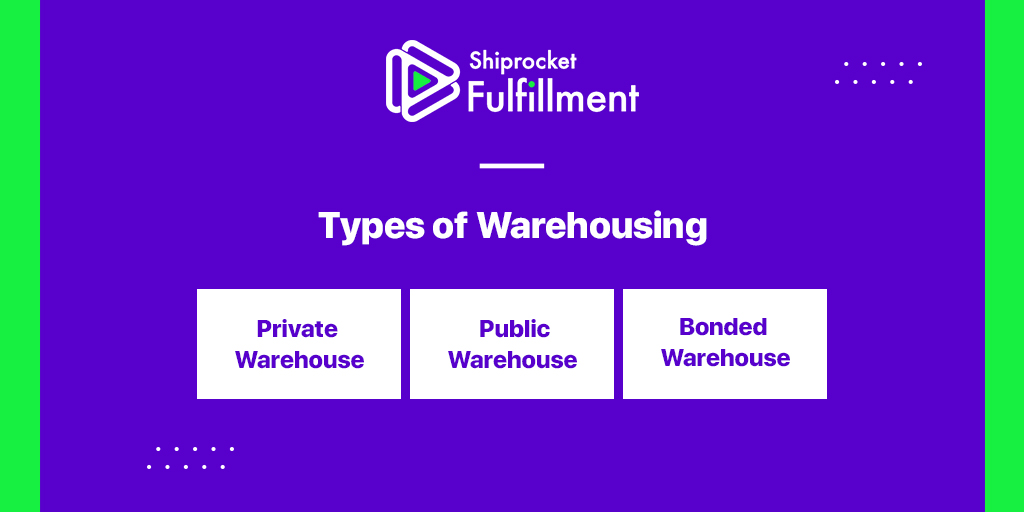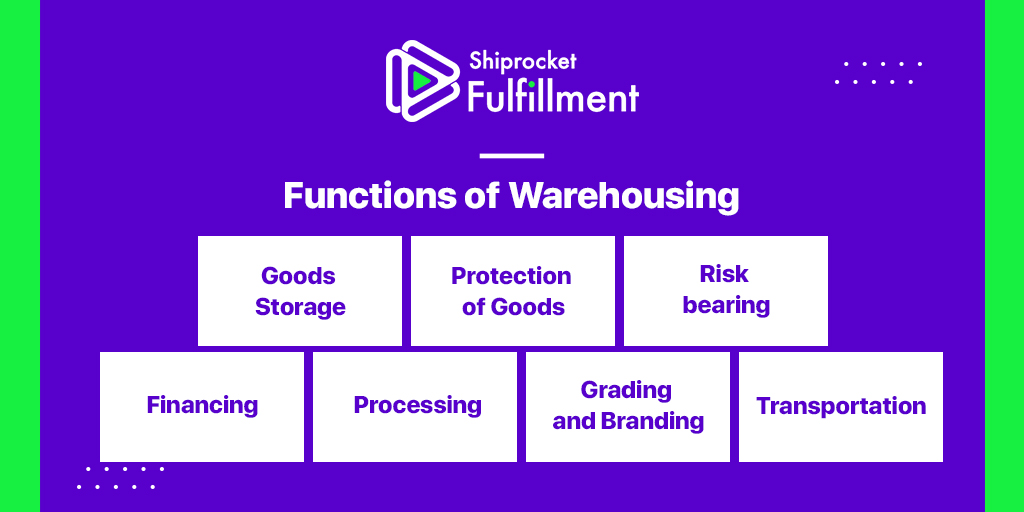Technological advancements are paving their way into most industries, and the warehousing industry is not an exception. The recent advances in the industry have redefined its day-to-day operations and functional aspects. The launch of end-to-end fulfillment solutions has further transformed the industry.

Considering their global scalability, businesses understand the importance of fulfillment solutions for their business. A warehousing fulfillment solution provider offers end-to-end fulfillment solutions where it stores the inventory and packs and ships the products on your behalf when you receive an order.
In this blog, we shall discuss what a warehouse is, the need for warehousing, features of warehousing, warehousing types, and functions.
What is Warehousing?
Warehousing is the act of storing physical goods before they are sold to customers. It stores the products safely and securely in an organized way. Keeping products in the warehouse helps track the items with convenience—when they arrived, how long they will stay in the warehouse, and the quantity in hand.
In an eCommerce business, the products are stored until an order is placed. Then it is directly shipped to the customer from the warehousing facility. However, in a retail setup, inventory is temporarily stored in a warehouse, and then it moves to the retail store.
A small business can keep products at home until they outgrow the space. Then a business can lease a warehouse or outsource logistics requirements to a third-party solution.
Need for Warehousing

- Some products are produced and manufactured during a particular season only. Warehousing is required for such products and also ensures they are available during the off-season as well.
- Similarly, some products are manufactured throughout the year, but their demand is only in a particular season. Warehousing is required in this case as well.
- A warehouse is also required by companies that opt for large-scale production and also bulk supply.
- Warehouse helps in ensuring that the product demands are met quickly and efficiently.
- Warehousing helps track goods production and their movement to ensure that the companies produce the goods continuously.
- Government stores necessary goods in warehouses and controls the supply in the market. Here, warehousing plays a crucial role in price stabilization.
- Bulk breaking is another such requirement for which warehousing is crucial. A trade agent imports goods from another country in bulk. He then takes all the products to his warehouse and divides them into small parts to supply to the buyers easily.
Types of Warehouses and Warehousing Features

The following are the three types of warehouses:
Private Warehouse
The private warehouses are the warehouses owned and operated by the business owners themselves. They fulfill their own storage needs. Notably, not all business owners can afford to operate their own warehouses as it requires heavy investment. Only big companies that require large storage capacity and can afford money can maintain private warehouses. These big companies have a network of their warehouses in different parts of the country to manage their sales and shipping.
Public Warehouse
It is a specialized warehouse that offers storage facilities to different businesses, whether big or small, throughout the country in return for a certain sum of money. A public warehouse can be owned and maintained by an individual as well as a cooperative society.
Public warehouses work in accordance with the rules and regulations set by the government. Notably, they are crucial for agricultural produce also. Therefore, the government, too, is encouraging the formation of public warehouses.
Nevertheless, public warehouses are useful to business communities as well. As discussed above, not all businesses can afford private warehouses because of the huge capital investment. Such companies can quickly meet their storage needs economically by making use of public warehouses.
Public warehouses provide storage facilities at a low cost. They are well-constructed and guarded 24×7. Also, these are generally located near most of the modes of transportation, such as highways, railways, and waterways.

Bonded Warehouse
These warehouses are licensed warehouses by the government and are used to keep imported goods until their custom duty is paid. They are generally located near ports. These warehouses are operated either under the customs authorities or operated by the government. The warehouses give an undertaking that they will not provide the products to the owners until the customs authorities give their consent. So, the goods can’t be moved without paying the customs duty.
So, the owner of the goods cannot use the products without getting permission from the customs authorities. Hence, they are called bonded warehouses.
Notably, bonded warehouses are beneficial for importers as well as exporters. If an importer can’t pay the customs duty immediately when his goods arrive, he can store goods in the warehouse. In fact, he can also withdraw the products in installments by paying small portions of customs duty.
Functions of Warehousing

The following are the functions of warehousing:
Goods Storage
Storage of goods is the most basic function of warehousing. The goods are first manufactured in the factory and then are stored in a warehouse till they are consumed by the consumers or brought by the buyer.
Protection of Goods
After storing, a warehouse also protects the goods from loss and damage from dust, dirt, heat, wind, and moisture. Warehouses also make special arrangements as per the products’ nature, like products that require a certain temperature to store them. Warehousing helps cut down losses due to wastage or spoilage during storage.
Risk bearing
Warehouses also take some risks while storing the goods. Once the goods are with the warehouse for storage, their safety and security’s responsibility passes on to the warehouse. So, the warehouse becomes responsible for any theft, loss, damage, or even fire. Thus, the warehouse-keeper takes all the precautions to prevent any mishap.
Financing
When goods are kept in a warehouse, the business unit receives a receipt against the deposit of goods. The warehouse-keeper can issue a document on the name of the owner of the goods, called the warehouse keeper’s warrant. This warrant is proof of the products kept in the warehouse.
While the goods are kept in the warehouse, the business owner can avail business loans from banks and NBFCs using this warrant as proof or security.
Processing
Some products are not used/consumed in the form they are manufactured. These products are first processed to make them consumable. For example, fruits are ripened, timber is seasoned, and paddy is polished. Some warehouses also undertake these services on behalf of the business.
Grading and Branding
Some warehouses also offer the services of grading and branding products on your behalf. You get various facilities for mixing, branding, and packaging products so they can be handled and sold conveniently.
Transportation
Some warehousing providers also include transportation arrangements to bulk depositors. Some even collect goods from the manufacturing place and send products to the delivery place.
The need for a warehouse is simple – to store inventory and protect products. In case you can’t afford to maintain your own warehouse, it is best to outsource to a third-party logistics provider that can store, package, and ship your products conveniently and seamlessly!






